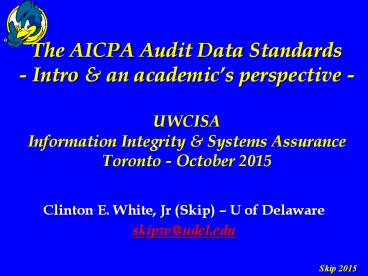The%20AICPA%20Audit%20Data%20Standards%20-%20Intro%20 - PowerPoint PPT Presentation
Title:
The%20AICPA%20Audit%20Data%20Standards%20-%20Intro%20
Description:
The AICPA Audit Data Standards - Intro & an academic s ... Would create routines to extract their data and populate XBRL GL instance documents Major ... – PowerPoint PPT presentation
Number of Views:119
Avg rating:3.0/5.0
Title: The%20AICPA%20Audit%20Data%20Standards%20-%20Intro%20
1
The AICPA Audit Data Standards- Intro an
academics perspective -UWCISA Information
Integrity Systems Assurance Toronto - October
2015
- Clinton E. White, Jr (Skip) U of Delaware
- skipw_at_udel.edu
2
The AICPA Audit Data Stds.
- The ADS
- Objective to standardize the format of data
fields and files commonly requested for audit and
related purposes (AICPA, Assurance Services
Executive Committee, 2013) - To improve the communication between auditors,
accountants, and IT personnel involved in the
request for, and exchange of, a companys data,
as well as, the efficiency of the audit process
(ADS Working Group, 2013)
3
The Audit Data Standards
- The challenge for both management auditors
- Obtaining accurate data in a usable format
following a repeatable process - The ADSs
- Facilitate identifying key info needed for audit
purposes in a standard format - Facilitate being able to assess its completeness
and integrity - The result should be consistent, understandable
data the opportunity for more extensive analysis
4
The ADSs
- Audit Data Standards (July, 2015)
- The Base standard
- Basic information about the clients ERP/AIS,
Business units, and System users - The GL standard
- GL details, Trial balance, Chart of accounts,
Source listing - The Order-to-Cash subledger standard
- Customers, Orders, Shipments, Invoices, AR,
Cash - The Procure-to-Payment subledger standard
- Suppliers, POs, Goods recvd., Invoices recvd.,
AP, Payments
5
The Base ADS
6
The GL ADS
7
The O2C ADS (part 1)
8
The O2C ADS (part 2)
9
The Order-to-Cash Cycle
10
The Order-to-Cash Cycle
- When you consider the Order-to-Cash cycle of your
client - What data would you like to have to investigate
the reliability of the processing of orders and
the accuracy of the data in their related
accounts? - When you request the data that you need, how do
you communicate your request to your client? - How do you document your request?
- How do you verify that you received what you
requested?
11
ERP/AIS Relational Tables
Employees FirstName LastName ContactInfo EmployeeI
d
Departments DepartmentName DeptAddress DepartmentH
eadId EmployeeId Title
ERPUsers ERPId EmployeeId ActiveStatus StatusModif
iedDate
Audit Data Standard Table
User_Listing User_ID First_Name Last_Name User_Act
ive_Status Title Department
12
Data Format
- What format do you want the data in?
- Flat-file format (pipe-delimited)
- 12345 Active Skip White CIO
- XBRL GL format
- ltgl-coridentifierCodegt12345lt/gl-coridentifierCod
egt - ltgl-coridentifierCategorygtsystemUserlt/gl-coriden
tifierCategorygt - ltgl-coridentifierActivegttruelt/gl-coridentifierAc
tivegt - ltgl-coridentifierContactFirstNamegtSkiplt/gl-corid
entifier ContactFirstNamegt - ltgl-coridentifierContactLastNamegtWhitelt/gl-corid
entifier ContactLastNamegt - ltgl-coridentifierContactPrefixgtCIOlt/gl-coridenti
fier ContactPrefixgt
13
(No Transcript)
14
(No Transcript)
15
(No Transcript)
16
The ADSs
- The ADSs
- Adoption is voluntary
- Benefits will drive adoption
- A company
- Would create routines to extract their data and
populate XBRL GL instance documents - Major advantages
- A standard way for internal external auditors
to communicate data needs to the IT staff - Data is extracted in a standard format
- A documented, reliable, repeatable process that
will streamline audits
17
Resources
- The AICPA ADS Library
- http//www.aicpa.org/InterestAreas/FRC/AssuranceAd
visoryServices/Pages/AuditDataStandardWorkingGroup
.aspx - XBRL.US
- http//xbrl.us/Pages/default.aspx
- XBRL International
- https//www.xbrl.org/
18
The future is already here its just unevenly
distributed! William Gibson
Thanks for your attention! Skip skipw_at_udel.edu































